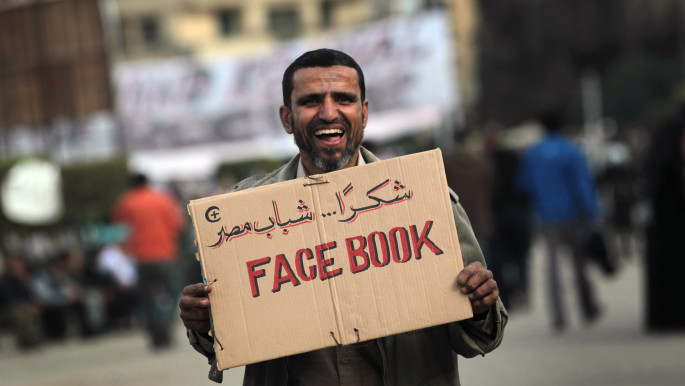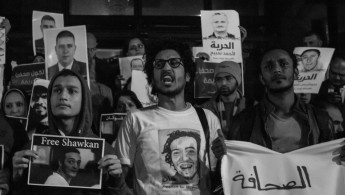Egypt eight years on: From social media revolution to journalists' jail
Eight years on, Egypt has reverted to authoritarian rule again, with the government of Abdel Fattah al-Sisi having imposed a series of measures to repress free expression.
Heres four ways in which free speech has been crushed in Egypt after the brief moment of hope that occurred in 2011:
1. Muzzling social media
Egypt's 2011 revolution was dubbed by many as the "social media revolution" due to the role played by online platforms in allowing citizens to organise, express themselves and keep up with the latest developments.
The country's social media savvy youth seemingly caught authorities off-guard, with the Mubarak government acting belatedly to block access to platforms like Facebook and Twitter. Recognising the power of such tools, the Sisi government has clamped down on online expression and introduced draconian legislation to counter dissent.
 |
| Egypt's 2011 revolution has been dubbed the 'social media revolution' [AFP] |
In September, President Sisi ratified a law granting the Supreme Council for Media Regulations the power to place people with more than 5,000 followers - on social media or with a personal blog or website - under supervision.
The council has the power to suspend or block any personal account which "publishes or broadcasts fake news or anything (information) inciting violating the law, violence or hatred".
Those who administer or visit such websites, intentionally or "in error without a valid reason", face jail time and fines.
In May, Egyptian authorities arrested a woman after she posted a video to social media complaining about sexual harrassment. Amal Fathi, 33, was convicted of spreading fake news and fined 10,000 Egyptian pounds ($560 dollars).
Fathi is awaiting another case in which she is accused of "membership in a terrorist group", according to her lawyer.
Egypt has become an increasingly dangerous place for journalists, with laws both acting as obstacles to reporting and threatening writers with jail time.
In 2018, Egypt led the way in jailing journalists on "false news" charges, with 19 spending time behind bars for violating media laws, according to a December report by the Committee to Protect Journalists.
According to reporters Without Borders, more than 20 journalists were arrested in the run up to Egypt's presidential election in March.
President Sisi won the contest with over 97 percent of votes. His sole opponent, little-known politician Moussa Mustafa Moussa, was a supporter of the president who made no effort to challenge him.
During the election, authorities fined one newspaper $8,500 for its reporting of the campaign and London-based news agency Reuters pulled a report on widespread electoral fraud after state threats of legal action.
Reporters Without Borders has described Egypt as "one of the world's biggest prisons" for journalists.
3. Forced disappearances
As well as jailing dissenters, Egyptian authorities have used forced disappearences to stunt free expression.
Human Rights Watch, citing figures from independent Egyptian rights campaigners, said in October that authorities have made at least 230 people disappear since August 2017 and are increasingly targeting journalists and rights activists.
President Sisi's government dismisses accusations of its involvement in disappearances as unfounded, alleging that in many cases those who disappeared left their families to join Islamic militants fighting security forces in the north of Egypt's Sinai Peninsula.
4. Media blackout
Access to online news is tightly controlled by Egypt's government, with the government having actively moved to block sites deemed critical of the Sisi regime.
Authorities have accused websites blocked in Egypt of spreading "fake news" or supporting "terrorism".
Last year, Egyptian authorities blocked the website of widely-read financial paper Al-Boursa, as well as its sister organisation Daily News Egypt.
Following similar actions by Gulf allies Saudi Arabia and the United Arab Emirates, Egypt also blocked access to Al Jazeera and Huffington Post Arabic.
The New Arab and its sister website al-Araby al-Jadeed have been blocked by Egyptian authorities since 2015.


![President Pezeshkian has denounced Israel's attacks on Lebanon [Getty]](/sites/default/files/styles/image_684x385/public/2173482924.jpeg?h=a5f2f23a&itok=q3evVtko)



 Follow the Middle East's top stories in English at The New Arab on Google News
Follow the Middle East's top stories in English at The New Arab on Google News


